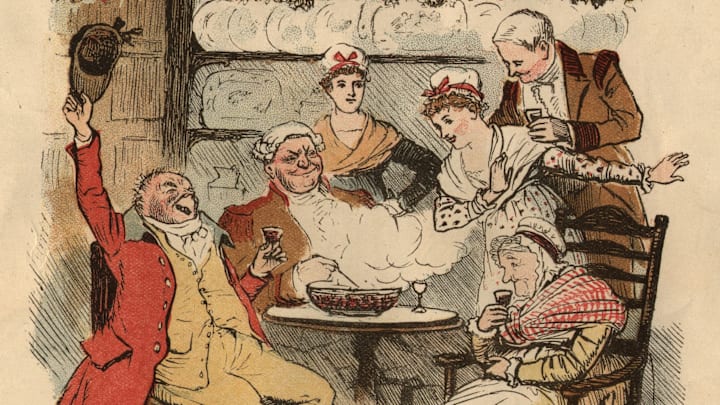It’s easy to think that wassailing is some cozy wintertime tradition that’s fun for the whole family. After all, there’s a jaunty, wholesome Christmas carol about it! But the truth is, if you ever see a minor out wassailing, you may want to call their parents.
- What Wassail Means
- Wassailing Through the Ages
- A Guide to Wassailing, Featuring the Original Lyrics of “Here We Come a-Wassailing”
What Wassail Means
The word wassail has many meanings. For centuries, it was a way to toast someone’s good health. Before the Battle of Hastings in 1066, English soldiers reportedly sang:
“Rejoice and wassail!
(Pass the bottle) and drink health.
Drink backwards and drink to me
Drink half and drink empty.”
But, in England, wassail also denoted the alcoholic beverage you imbibed during that toast—an elixir of steamy mulled mead or cider. Sometimes, wassail was a whipped dark beer flavored with roasted crab apples.
Wassailing Through the Ages
Wassail was usually slurped from a communal bowl before, during, and after big events and holidays. It was supposedly on the menu during Lammas Day, a pagan autumnal harvest holiday that involves transforming cornhusks into dolls. It was also imbibed on Twelfth Night, a January holiday that involves lighting a fire in an orchard, dancing, and singing incantations to apple trees in hopes of encouraging a bountiful harvest.

By the Middle Ages, the practice of sharing a giant bowl of wassail—that is, the practice of wassailing—evolved from a holiday celebration to a form of boozy begging. “At Christmastide, the poor expected privileges denied them at other times, including the right to enter the homes of the wealthy, who feasted them from the best of their provisions,” Robert Doares, an instructor at Colonial Williamsburg, explained in 2007. The poor would either ask to sip from their rich neighbor’s wassailing bowl or would bring their own bowl, asking for it to be filled. According to Doares, “At these gatherings, the bands of roving wassailers often performed songs for the master while drinking his beer, toasting him, his family, his livestock, wishing continued health and wealth.” The original lyrics of Here We Come a-Wassailing are quite upfront about what’s going on:
“We are not daily beggars
That beg from door to door
But we are neighbours’ children
Whom you have seen before.”
Not all rich folk were happy to see wassailers at their doorstep. One 17th century polymath, John Selden, complained about “Wenches … by their Wassels at New-years-tide ... present you with a Cup, and you must drink of the slabby stuff; but the meaning is, you must give them Moneys.”
Misers like Selden may have had a point: Since alcohol was involved, wassailers often got too rowdy. “Drunken bands of men and boys would take to the streets at night, noise-making, shooting rifles, making ‘rough music,’ and even destroying property as they went among the wealthy urban homes,” writes Hannah Harvester [PDF], formerly the staff folklorist at Traditional Arts in Upstate New York. In fact, boisterous wassailers are one reason why Oliver Cromwell and Long Parliament passed an ordinance in 1647 that essentially banned Christmas.
By the 19th century, wassailing would mellow. Beginning in the 1830s, music publishers started releasing the first commercial Christmas carols, uncorking classics such as God Rest Ye Merry Gentlemen and The First Noel. Among them were dozens of wassailing songs, including the circa 1850 Here We Come a-Wassailing and many others that are now, sadly, forgotten. As the custom of caroling became the dominant door-to-door pastime, alcohol-fueled begging dwindled, and by the turn of the 20th century, carolers were more likely to sing about libations than actually drink them.
A Guide to Wassailing, Featuring the Original Lyrics of “Here We Come a-Wassailing”
But if you’re interested in engaging in some good, old-fashioned wassailing, the original lyrics to Here We Come a-Wassailing are a helpful guide. For starters, ask for beer.
“Our wassail cup is made
Of the rosemary tree,
And so is your beer
Of the best barley.”
Don’t be shy! Keep asking for that beer.
“Call up the butler of this house,
Put on his golden ring.
Let him bring us up a glass of beer,
And better we shall sing.”
Remind your audience that, hey, this is the season of giving. Fork it over.
“We have got a little purse
Of stretching leather skin;
We want a little of your money
To line it well within.”
Screw it. You’ve sung this far. Go for it all, go for the gold, go for ... their cheese.
“Bring us out a table
And spread it with a cloth;
Bring us out a mouldy cheese,
And some of your Christmas loaf.”
Thirsty for your own wassail? Stock up on sherry and wine and try this traditional recipe from The Williamsburg Cookbook.
Discover More Answers to Big Questions:
A version of this story ran in 2017; it has been updated for 2024.
